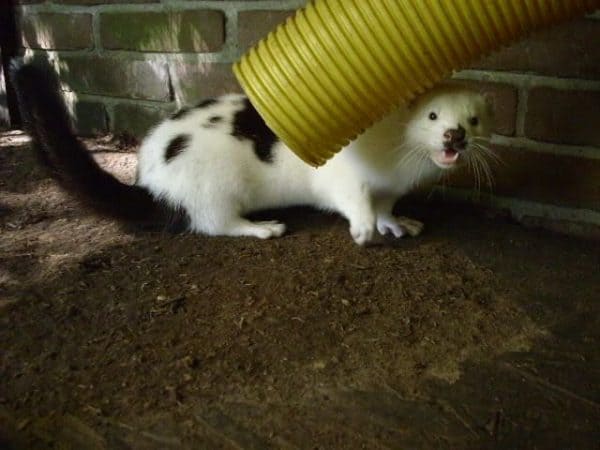Dalmatian Ferrets look a lot like the popular dog breed but they can be pretty rare in some parts of the world. Generally, they’re white with black spots on their body. However, the black spots vary a lot from ferret to ferret as they’re usually grouped in various parts of the body. This includes the lower back, shoulders, face, etc.

This makes these beautiful ferrets look quite hilarious in some cases as face dots add to their facial expressions, making them even more adorable when they beg for food or attention. But other than the way their coat is colored, there is no difference between this ferret and others.
What do Dalmatian Ferrets Look Like?
Dalmatian Ferrets have a very beautiful white undercoat and topcoat that makes you confuse them with albino or dark-eyed white ferrets if you don’t notice the dots. Some ferrets have very subtle black dots across their faces that often look like freckles.
Other Dalmatian Ferrets have a few very big dots on the back that can be placed on the shoulders, on the middle of the back, or on the lower back. You won’t find ferrets having those black dots over their whole bodies as dalmatian dogs do, but they resemble them a lot.
Most of the time, Dalmatian Ferrets are white-colored ferrets that have black spots. It’s extremely rare to find a white ferret with dots that are differently colored. And it’s a lot rarer to find ferrets with other types of fur colors that have the same black spots.
These ferrets complete the look with black or dark red eyes. They don’t have any circles around them or a face mask of any kind. And the nose is always pink. There are various types of ferrets in the entire world, including 8 common coat colors and 12 patterns and shades.
Grooming Ferret Coats – Brushing and Bathing
A short-bristled brush made for ferrets and a few treats is all you need to start brushing your ferret’s coat. While they tend to groom themselves every day, you still need to help your pet have a smooth and good-looking. It might be a bit difficult at first, but with the time you will both start to enjoy the grooming process as it strengthens the bond between the two of you.
Usually, after a good brushing session, you won’t even fill the brush once. But when the shedding season comes, it’s a whole another story. You will need to have a bag nearby where you can throw all the hair that you brush. More than that, you will need to go from brushing its coat once a week to brushing it every two days or so.
Brushing also helps with keeping the unpleasant smell under control. The ferret keeps releasing oils into the skin which helps both the skin and the fur remain healthy. But if the fur is very entangled, lots of these smelly oils remain gathered in those places and the ferret ends up stinking again.
While bathing might seem like the way to go to get rid of bad smells, ferrets will never stop secreting those smelly oils so you need a more permanent way to get rid of the musky smell. Lots of ferret owners invest in products that are made specifically to get rid of it.
However, most of these products do nothing but mask the odor with another smell, which in the end it starts smelling like a mix between ferret smell and the product’s odor. This can be easily compared to someone that instead of taking a shower he just keeps adding more and more perfume to cover it up.
On the other hand, you should focus on finding an odor neutralizer instead of something that adds its own smell on top. A good neutralizer can keep the smell under control for quite some time without wiping out the oils or creating another smell that’s more uncomfortable.
But the product should never be sprayed directly on the ferret. Instead, it should be sprayed on a thin cloth, paper towel, or something similar. Then you can use the cloth to rub the neutralizer onto the fur.
Frequently Asked Questions:
What are the most common types of ferret coats?
The 8 most common types of ferret furs are albino, dark-eyed white, blaze, black, black sable, champagne, cinnamon, and chocolate. Albino ferrets are the most common while cinnamon is a quite rare ferret coat.
Are Dalmatian Ferrets difficult to care for?
Dalmatian Ferrets are easy to take care after as they’re clean animals, which means you won’t spend much time brushing and bathing them.
